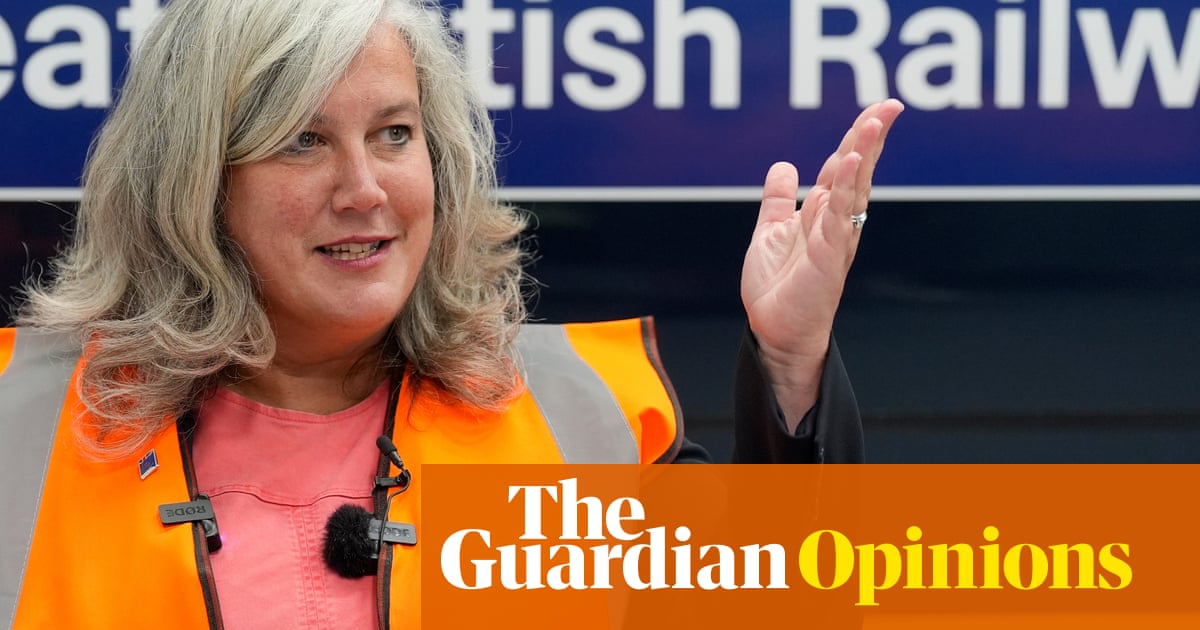Government guidance documents rarely feature soaring prose to fire the imagination. But a recent Department for Transport policyupdatecontained one passage to lift the spirits of train users up and down the country. Setting out the future of Great British Railways (GBR), the public body that will oversee a renationalised and reintegrated rail network, its authors observe that “instead of having to navigate 14 separate train operators, passengers will once again simply be able to use ‘the railway’”.
Last month, this journey back to the futurebeganas the first renationalised South Western Railway (SWR) service departed Woking for London Waterloo, complete with union jack branding and the logo “Great British Railways: coming soon”. The remaining nine private franchises will be back in public ownership by 2027, by which time a new GBR headquarters will be up and running in Derby. The transport secretary, Heidi Alexander, hailed the moment as a new dawn. There can be little doubt that a reset is badly needed. Fragmentation, in the name of competition, was the original sin of the destructive and ideologicalprivatisationof the rail network in the 1990s. The wrongheaded decision to separate the management of track and trains led to confused accountability and buck-passing between train operators and Network Rail.
Accompanying marketisation, and the restless search forprofit, inaugurated an era in which a baffling profusion of ticket types did little to mitigate the cost of travelling on the mostexpensivetrains in Europe. Poorperformanceby franchises such as Avanti West Coast and TransPennine Express (takenbackinto public ownership in 2023) undermined public confidence in an industry crucial to Britain’s green transition. A period ofdisastrousindustrial relations, and reduced passenger numbers since the pandemic, have compounded a sense of crisis.
It would be foolish to hope for an instant turnaround. The future shape and finances of rail travel are still unclear, following the post-Covidcollapsein lucrative commuter and business travel. But having been constituted explicitly as a publicly run “guiding mind” for the whole network, carrying responsibility for both track and trains, GBR will have the power to rationalise its operations and place the interests of passengers first. A simpler, more joined-up ticketing system should be a priority.
Somewhat bathetically, the optics of last month’s SWR launch were compromised by Sunday engineering works and the need for a rail replacement bus from Surbiton to London Waterloo. Some things never change. But though free-market dogmatists will have relished that hitch to proceedings, a large majority of the population stronglywelcomethe prospective return of a vital public good to public hands. Much of their support, however, is undoubtedly linked to a hope that GBR will do something to address the often prohibitive cost of travelling by rail in Britain. On the subject of cheaper tickets, Ms Alexander has been noticeably reticent,pointingto current subsidies of £2bn a year.
Labour should think bigger. In the 1960s, Ms Alexander’s predecessor in the Department for Transport, Barbara Castle,pioneeredthe idea of a subsidised “social railway” in the wake of the deeply unpopular Beeching cuts. After a disruptive and demoralising period, a similar level of imagination is needed today for an industry that delivers crucial economic, environmental and societal benefits.
Do you have an opinion on the issues raised in this article? If you would like to submit a response of up to 300 words by email to be considered for publication in ourletterssection, pleaseclick here.
